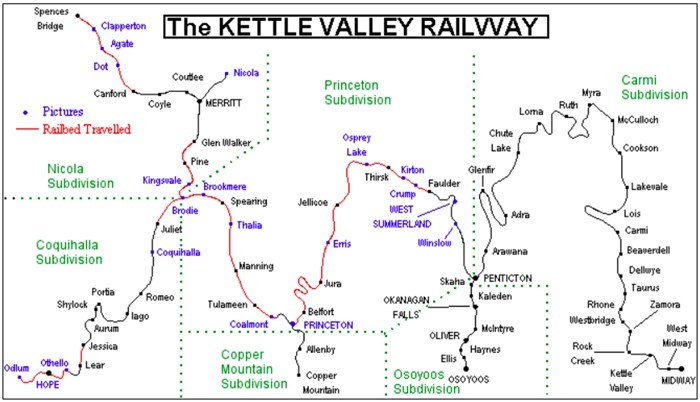
Myra Canyon shortly after completion of the rail line looking eastward from above the tunnel, taken around 1915.
Image Credit: Submitted/Penticton Museum and Archives/PMA24706
September 02, 2023 - 7:00 PM
The Myra Canyon on the Kettle Valley Railway in the Okanagan is world renowned for its spectacular trestles created originally by engineer Andrew McCulloch.
He in turn is known for naming stations along the Coquihalla Highway after famous Shakespearian characters like Juliet, Portia and Iago.
While he was a big fan of Shakespeare, he didn’t carry that naming pattern throughout the more that 400 kilometres of rail line he built from Midway to Hope between 1910 and 1916.
That means Myra was not character in any Shakespearean play. But she still has her own special charm.

Image Credit: Submitted/Touring the Kettle Valley Railway
When McCulloch came to what is now Myra Canyon he was faced with five canyons crossing KLO and Pooley creeks.
One historical source says the area was originally called Five Finger Canyon while another refers to one of the trestles as West Fork Canyon Creek but such historical references are scarce.
Those names, of course, were not what Syilx people called the area. Neither Westbank First Nation nor the Okanagan Nation Alliance returned requests from iNFOnews.ca for information on the original names for the canyon.
READ MORE: How Europeans distorted the true names of Kamloops and the Okanagan
What McCulloch did was name the station at the eastern end of the canyon Myra, which soon took over as the official name for the entire canyon.
Myra was the name of J.L. Newman’s daughter. He was an assistant engineer on the construction project.
At the other end of the canyon, McCulloch established Ruth Station in honour of his own daughter. But it was Myra that endured as the name for the canyon, trestles and the Myra-Bellevue Provincial Park.
The name Myra dates back into antiquity when it was the capital city of ancient Lycia (now Turkey).
“The name was popularly associated with the Greek name for myrrh (Greek for "bitter"), an aromatic resin obtained from a small thorny tree,” the Urban Dictionary says. “Myrrh was used widely for incense and fragrance, medicinal purposes, anointing the dead, and for flavouring wine.”
The city once had a large Greco-Roman amphitheater and a great temple to the goddess Artemis that was destroyed at the command of St. Nicholas in the fourth century, A.D.
St. Nicholas, who was named Bishop of Myra at a young age, was known for his generosity to those in need and later transitioned into Santa Claus.
But that's a whole other story.
To contact a reporter for this story, email Rob Munro or call 250-808-0143 or email the editor. You can also submit photos, videos or news tips to the newsroom and be entered to win a monthly prize draw.
We welcome your comments and opinions on our stories but play nice. We won't censor or delete comments unless they contain off-topic statements or links, unnecessary vulgarity, false facts, spam or obviously fake profiles. If you have any concerns about what you see in comments, email the editor in the link above. SUBSCRIBE to our awesome newsletter here.
News from © iNFOnews, 2023